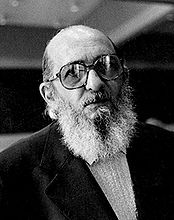Freire, Conscientization & Digital Literacy
 Before I begin, I confess not to have read Freire in the original Portuguese so I may have missed a nuance or two. What I’m trying to do is link some of his thinking around Conscientization to the concept of Digital Literacy (and other ‘new literacies’) through the lens of Pragmatism.
Before I begin, I confess not to have read Freire in the original Portuguese so I may have missed a nuance or two. What I’m trying to do is link some of his thinking around Conscientization to the concept of Digital Literacy (and other ‘new literacies’) through the lens of Pragmatism.
Paulo Friere (1921-1997) was a Brazilian educator and philosopher best known for his seminal work Pedagogy of the Oppressed. His ideas were heavily influenced by his Catholicism and his (somewhat ambiguous relationship with) Marxism. One of the key themes of his work is that of Conscientization or ‘critical consciousness’, explained by Taylor in The Texts of Paolo Freire (1993) as the type of consciousness that can transform reality. Taylor claims that Freire does not mean by this that objectivity is created by consciousness – for example, to believe you are free does not make it so – but education is nevertheless a means of transforming reality.
The part of Conscientization I believe applies to conceptions of digital literacy is encapsulated, although not teased out fully, in the following statement by Freire:
Conscientization occurs simultaneously with the literacy or post-literacy process. It must be so. In our educational method the word is not something static or disconnected from people’s existential experience, but a dimension of their thought-language about the world. (1970:222)
That is to say that ‘literacy’ as a concept does not really exist as such – it is a construct that we abstract from experience and communication. There would be, therefore, for Freire, no such entity as ‘digital literacy’ but only individuals who are ‘digitally literate’. Whereas Freire couched this in terms of those who are critically literate and therefore able to engage in a literate way with their own emancipation, we can apply this to those who may be considered digitally literate and therefore able to engage in a ‘literate’ way with their digital world.
Education transforms reality, believed Freire, because it can never be neutral. It always includes elements of both ‘domestication’ and ‘liberation’, the two seemingly opposite ideas being held in tension through what I would term a ‘creative ambiguity’. As Taylor explains, Freire, whilst championing (a certain type of) literacy, was wary of it because of his Marxist tendencies:
Society requires literacy because in the power-knowledge relationship of the modern world, literacy defines who controls the means of production, that is the means to produce wealth (industry) and the mans to reproduce knowledge (education). (1993:139)
The difficulty is with the English language itself, which does not disambiguate ‘non-literacy’ and ‘sub-literacy’ in the term illiteracy. The difficulty with this is that the ambiguity from such definitions of ‘classic’ literacy become built-in to new literacies and other concepts that use the seemingly-innocent and obvious term ‘literacy’ as their bedrock.
I’m going to leave it to Taylor to sum-up, given that he puts so succinctly my own view of what we’re talking about when we talk about literacy:
[T]here seems to be no ontological imperative that necessarily correlates literacy with transforming knowledge… What is significant is not the actual learning to read and write but rather that relationship between the word, reality and the ways in which the latter is transformed by the former. (1993:61)
I’m still thinking about this and mulling it over. What are your thoughts? Do you agree that literacy is a construct that cannot really be considered independently of the people to whom the word ‘literate’ applies? What about ‘digital literacy’? 🙂

You have raised the intellectual bar with this post Doug. Your use of Freire’s association of literacy with power relations is very timely for me. I was forced to consider my views on this association at a seminar recently where a researcher’s thesis was that the pictures in the early readers are an obstacle to children decoding the text. While this relationship might be claimed through evidence generated through experimental methods and cognitive load theory, what was more interesting for the sociolinguistics in the audience was the factors that the researcher chose not to examine such as the effect of culture and power on the understanding rather than the decoding of text. Now your post reminds me of the same tension in digital literacies. We can treat as a skillset of technical competencies that need to be acquired or consider the broader questions about what political positions are mobilised or silenced through digital devices. I retain a possibly naive position that open source technical software combined with a philosophical commitment to open sharing and collaboration is enabling a democratization of literacy. However, there is still a price barrier to the Ipad/Iphone world that will prevent true representative democracy in the way Freire did with his work.Anyway, thanks for your challenging and provocative work around this concept of digital literacy. It is well overdue.Tony
No problem, Tony – glad I made you think! I’d love to think that everyone
would end up sharing the same philosophical position as me (and, seemingly,
you) but in the real world it comes down to making it easy for people to
make the right decisions. If you haven’t read ‘Nudge’ then I’d certainly
have a look it about ‘decision architectures’. 🙂
Thanx for the Nudge! I will get onto it as soon as I recover from Australia’s 0-4 humiliation!